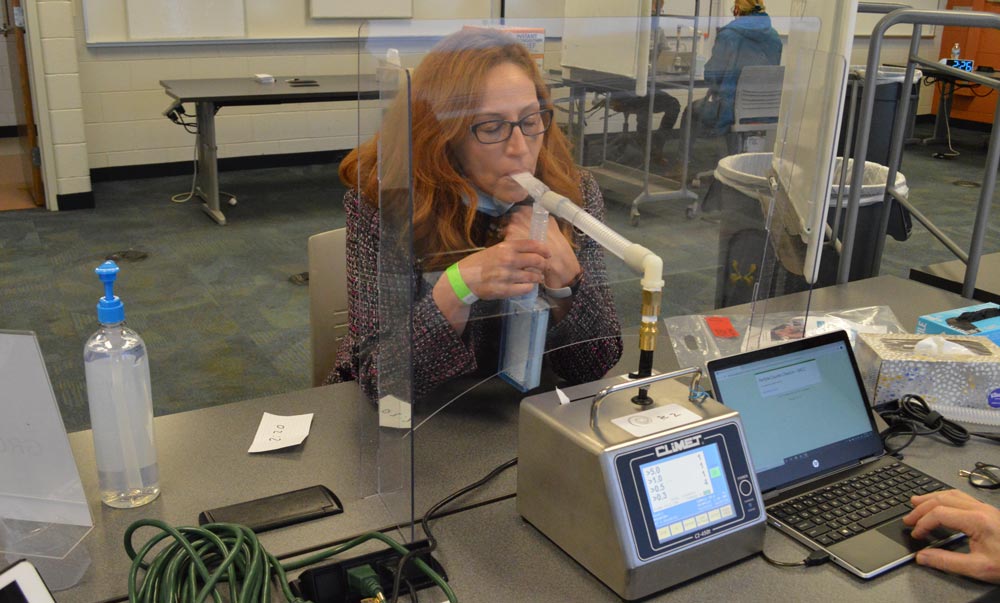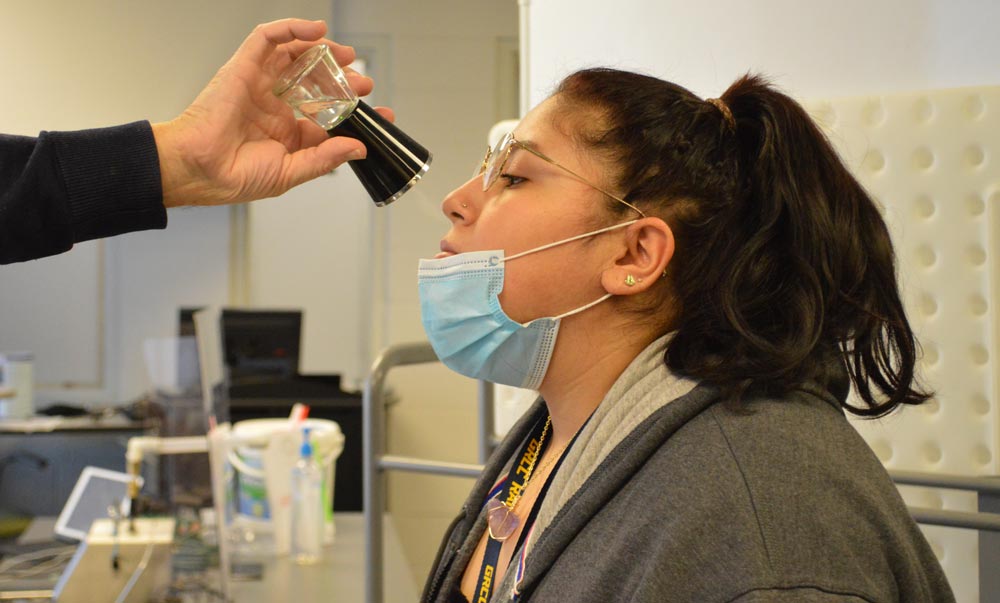Grand Rapids Community College — For a second time, GRCC Vice President of Finance and Administration Lisa Freiburger breathed deeply into a particle detector system, operated by aerosol scientist and inventor David Edwards.
The reading on the machine showed a huge decrease in the level of particles released from her lungs since her first reading moments before, and after she inhaled mist from the airway-cleansing product, FEND. The device was developed by Edwards, a GRCC alumnus, Harvard University professor and CEO of Sensory Cloud in Boston. It was named one of the top 100 inventions of 2020 by Time Magazine on Thursday.
GRCC is participating in Edwards’ study about aerosols and their role in the spread of disease. FEND, he said, can add another layer of protection to mask wearing, hand sanitizing and social distancing in the fight against COVID 19.
“I think it’s fabulous we are able to host this study,” Freiburger said. “We are very conscious and cautious of all the COVID protocols and we want to make sure our students are safe. It’s amazing we are able to participate in this way.”

Another Layer of Protection
GRCC students, staff and community members were paid $15 to participate in the study, which took place Monday and Tuesday in GRCC’s Sneden Hall. Students breathed into the device to measure the level of particles they produced before and after using FEND.
FEND works without drugs or an antiviral component. It is an over-the-counter saline mist that uses calcium rich-salts naturally found in the body. Inhaled through the nose, it slows down or stops various aerosol molecules from entering the nasal passage.
That’s key in fighting COVID-19, because a person who exhales a high number of particles could be a super spreader, Edwards said.
“In 100 people, you get 20 people that are producing most of the aerosol,” he said. “The point is that these little droplets are not filtered by our masks … This is a way of cleaning your airways to get rid of those particles.”
It’s mutually beneficial, he said. “It helps you because there are fewer of these particles getting deep into your lungs, and it helps me because you are not breathing these into the environment.”
Edwards is a graduate of Forest Hills Central High School and Grand Rapids Junior College, now GRCC. He earned a Bachelor of Science from Michigan Technological University and a doctorate from Illinois Institute of Technology, both in chemical engineering. He taught at Massachusetts Institute of Technology and Penn State University before joining the Harvard faculty for 16 years, starting in 2002.
Edwards is also the son of former GRCC chemistry professor Ronald Edwards.
He asked if the college could be the Midwest location for the study. “GRCC has been an incredible leader in the community. For this to be happening here means a lot to me and I think it’s amazing.”
FEND, which became available two weeks ago, has potential in schools and institutions, sports and extracurricular activities. It is already being used by schools in Massachusetts and Milwaukee, and is planned for use at a school in Los Angeles. GRCC and other local schools are in conversations to use the product as well, Edwards said.
“We are making systems that allow large numbers or people to self administer,’ he said.
Lasting Innovation, New Habits
Edwards said even post-pandemic he believes nasal hygiene will be part of routine preventive health-care practices, especially during flu season and in polluted environments.
“We’re learning how we can function normally even in the presence of an airborne disease. There’s a lot we are learning about social distancing, cleansing, masks or no masks, and FEND is clearly part of that. All these things are changing how we live,” he said. “It’s clear when the epidemic is over that there will be some environments where extreme hygiene will be practiced. Others, by virtue of wanting to be cleaner and less at risk, will have new habits.”
Study participant Chris Kozal, a GRCC graduate who now works in admissions, had a very low particle reading even before using FEND. It dropped to next to nothing after use.
“If you get a lung infection like the flu or COVID you suddenly produce a lot. We all can vary,” Edwards said.
Kozal said he was happy to be involved.
“I did a little bit of research, and it sounded like a pretty good idea so I wanted to see it and see if it worked,” he said. “Honestly, it’s good to see what they are doing and have a sneak peek of what’s coming up. I’m excited about it. It seems like really good stuff.”














